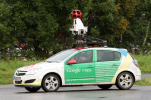Chip
Well-Known Member
- Joined
- Sep 11, 2017
- Messages
- 2,209
- Reactions
- 2,729
Yes, I agree. The reason that I emphasize governmental action is because the US and state constitutions limit state not private action. But the forced public broadcast of data raises not just constitutional but other serious concerns which makes it even worse.Many of you are only pointing out govt use of RID. Let's not forget the public at large will have access to the info.
For the car analogy, it's as if you could tune into an FM station where you could hear the car's plate number, where the car is and where it came from, how fast it is driving, right from the comfort of your living room.
Last edited:












